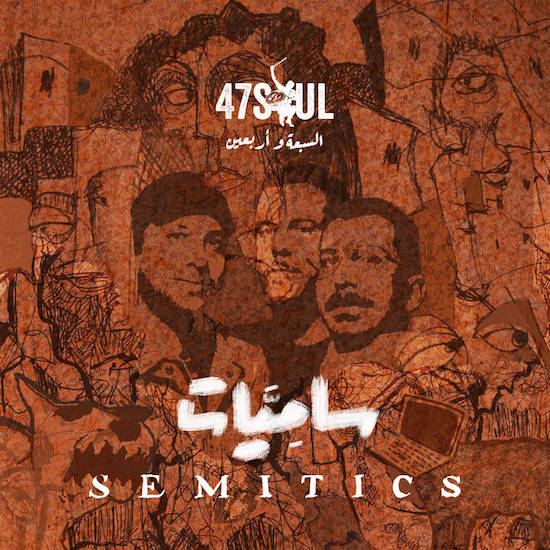On the day the Palestinian band 47Soul released their third album, Samiyat (or ‘Semitics’), they added to their Instagram story a clip of dancers on a bus performing a cramped version of debke to the album. When the band – comprised of musicians Tarek Abu Kwaik, Hamza Arnaout (who has since left 47Soul), Walaa Sbait, Ramzi Sulayman – came together in 2014, they hoped their music would produce community. The goal was to create a space uniting vastly different Palestinian experiences, partly by blending debke, hip-hop and electronica. It’s a somewhat natural fit: hip-hop and debke share some reflexes, like self-referentiality and rapid-fire lyric-delivery. The band’s very first track, ‘Intro to Shamstep’, laid out their mission-statement using the year 1947 as a lynchpin, the last year the people of Bilad al-Sham, greater Syria, could travel freely amongst one-another, before the ensuing violence devastated the Palestinian people. On their subsequent, always bilingual releases, the (2015) crowd-funded EP Shamstep and 2017’s Balfron Promise, 47Soul continued exploring themes of borders, access, surveillance, incarceration and Palestinian identity.
Semitics adheres to debke’s dual history as a celebratory dance, often performed at weddings, and as a form of resistance against the Israeli occupation. Debke’s influence is on almost every 47Soul song, through the percussion and the electronically produced mijwiz. The flutish mijwiz, with its incomparably joyous sound, is a vocalist in itself, fronting ‘Debke System’ and ‘Border Ctrl’. The videos also feature debke dancers from Palestinian and Jordanian communities. Semitics’ lyrics oscillate between extreme hope (“We’re going to dissolve this Mexico-Bethlehem wall”, in ‘Border Ctrl’; “mnw’a taht mntla’ fa’, we fall down, we get up” in Debke System) and bleakness, on tracks like the dystopic ‘Witness’ and ‘Lil Disco’, which rely less on debke and venture into trip-hop. ‘Border Ctrl’ mashes its mijwiz-inflected sense of hope with double-pronged lyrics. Its chorus, “itfadalu ala al-sa’af, ya talabu al-hawiya”, invites people to step into a debke-line, but also reminding the audience how precarious borders are for Palestinians and Latinx individuals, especially as the track features Spanish-language rapper Fedzilla on the bridge. The album closer ‘47 Cocktail’, an ode to community and freedom of movement with a stellar mijwiz performance by Hassan al-Minawy, encourages the listener to just get up and dance.
It’s not surprising Semitics’ least successful tracks deviate from debke and try reggae on for size. Strangely enough, some of these same songs, like ‘Sam’s People’ (which just confuses me) take on the idea of Palestinian unity, which itself 47Soul cannot fully articulate, since Gaza and its multitudes are missing here. Transnational solidarity with Black movements is also a muddy line. I have critical questions about 47Soul’s lyrical references to Jim Crow on ‘Thobe’, which draws equivalences between Palestinian and Black American realities. While both face racist systemic violence, there is a danger here, given the Arabophone world’s history of anti-Blackness’ history and other racisms; while it remains undiscussed, much Arabic-language hip-hop –not necessarily 47Soul’s work– is mired in cultural appropriation and racism.
In the Arabic music scene, praise is often delivered based on how little a song sounds like Arabic music. It’s meant as a complement, directed at hip-hop and rock acts whose output, were they in English, would fall seamlessly into other settings. It’s also a classist jape at people who listen to ‘sha’abi’ music, a genre that criss-crosses the Arabophone world and generally describes different forms of rural music now set to electronic music, including debke. 47Soul largely succeeds at being an inclusive sound that understands that in order to survive, Palestinians rely on reflexes of both hope and despair. Semitics is another link in debke’s hereditary chain: for the most part, the album is joyful and always political. Even though the full extent of 47Soul’s creativity is naturally best experienced with knowledge of Arabic and of debke’s musical conventions, Semitics, along with 47Soul’s previous releases is an excellent introduction to debke music for the uninitiated. At the same time, listening to Semitics, I feel drawn back into the fold of debke music and its ability to speak to Palestinians of multiple generations.


